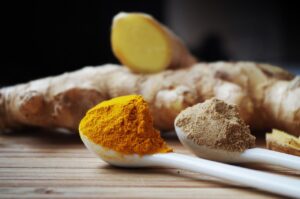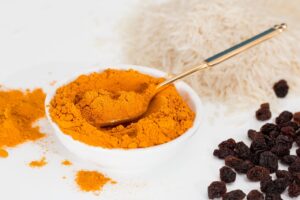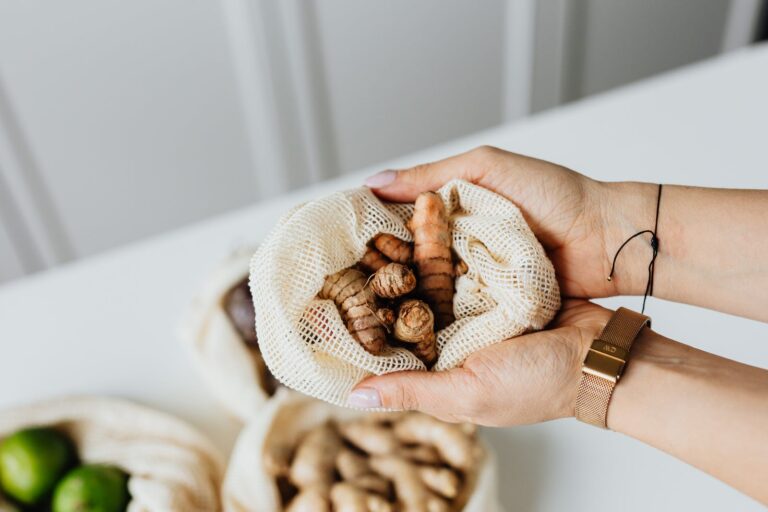Exploring the golden spice of turmeric isn’t just a journey through flavor—it’s a deep dive into wellness, especially when it comes to boosting fertility. Packed with antioxidants and anti-inflammatory properties, turmeric’s potential benefits extend far beyond its culinary uses.
I’ll uncover the intriguing connection between turmeric and reproductive health. From its role in reducing inflammation to enhancing the nutritional profile of your meals, we’ll see how this vibrant spice could be a game-changer for those looking to support their fertility journey.
The Benefits of Turmeric for Fertility

Turmeric and Fertility: A Spice for Life
As I delve deeper into the link between turmeric and fertility, it’s fascinating to see how this vibrant spice can play a pivotal role in enhancing reproductive health. Found in the ginger family, Curcuma longa—or turmeric—is more than just a staple in Asian cooking; it’s a medicinal powerhouse. With its anti-inflammatory properties and the ability to help the body fight free radicals, turmeric has long been used in traditional medicine.
The active component, curcumin, is a powerful antioxidant that’s been shown to improve fertility in several ways. For one, it can minimize oxidative damage that may affect egg health and boost fertility. The presence of antioxidants in turmeric helps the body to neutralize harmful free radicals—a key factor considering the sensitive nature of the reproductive processes.
Incorporating turmeric into a fertility diet is something I’ve found particularly beneficial. Its medicinal benefits extend to the reduction of inflammation, which is crucial when considering conditions like endometriosis or uterine fibroids—that may hinder conception. Turmeric’s compounds have been observed to influence various signaling pathways that are responsible for cell growth and repair, providing a therapeutic angle for fertility enhancement.
Harnessing the Therapeutic Doses of Turmeric Powder
When it comes to fertility enhancement with turmeric, getting the dosage right is critical. While high doses are not recommended, especially without medical guidance, therapeutic amounts can be beneficial. Adding turmeric powder to meals is a simple way to incorporate its goodness into your diet. I’ve found that it not only enhances the flavor but also contributes positively to my overall health.
I’ve noticed that the anti-inflammatory effects of turmeric may help with conditions that affect fertility, such as inflammation in the fallopian tubes or the presence of ovarian cysts. Balancing these conditions aids in creating a conducive environment for embryo implantation, revealing how turmeric can benefit fertility in tangible ways.
Improving Fertility with Turmeric: Beyond the Kitchen
Turmeric’s impact on fertility isn’t limited to its ingestion. Some preliminary research suggests that the components in turmeric might support reproductive health through molecular mechanisms affecting hormonal balance and blood flow, essentials for those trying to conceive. Pregnant women, however, should consult their healthcare provider to understand if and
Turmeric’s Anti-Inflammatory Effects on Reproductive Health

When we explore the nexus between dietary supplements and reproductive wellness, turmeric stands out, especially regarding its anti-inflammatory properties that could potentially benefit fertility. As a key ingredient in my kitchen, I’ve delved into how it could help individuals looking to enhance their fertility.
Turmeric and Fertility: The Inflammation Connection
When it comes to infertility, inflammation is often a silent saboteur. Chronic inflammation can affect the reproductive organs, potentially leading to conditions like endometriosis or uterine fibroids, which can severely impede a couple’s efforts to conceive. My research suggests that turmeric, with its robust anti-inflammatory properties, could be a significant ally for those facing such hurdles.
Curcumin, the primary active compound in turmeric, has been studied for its potential to diminish pro-inflammatory markers in the body. Its role in reproductive health is fascinating, as it may help alleviate inflammation within the reproductive organs. For women with conditions like endometriosis or uterine fibroids, integrating an anti-inflammatory agent like turmeric into their diet might just be the edge they need for fertility enhancement.
In the realm of therapeutic doses, it’s critical to strike the right balance. It’s been widely accepted that turmeric is safe in food amounts, and moderate supplementation has also shown promise without adverse effects. However, high doses or long-term use should always be approached with caution and under medical advice, especially when considering turmeric for fertility enhancement.
The Role of Turmeric in Hormonal Regulation
Hormonal imbalances are a common culprit behind fertility issues. As I’ve learned more about turmeric, I’ve become intrigued by its use in traditional medicine for hormone regulation. While modern scientific research is still catching up, preliminary data suggest that turmeric could be a pivotal player in modulating hormonal activity, which in turn could foster an environment more conducive to conception.
Turmeric Powder: Adding it to a Fertility Diet
Incorporating turmeric powder into a fertility diet isn’t just about seasoning food; it’s a strategic move toward improving overall reproductive health. Whether it’s blending it into a smoothie or adding it to a warm dish, turmeric’s presence in the diet can be a simple yet powerful tool.
I find that the key to getting the most out of turmeric’s medicinal benefits is consistency. Regular consumption of all the right ingredients, including turmeric powder, contributes to creating an environment in your body that supports fertility. Think of it as a daily ritual, a delicious commitment to nurturing your reproductive well-being. Turmeric, with its active compound curcumin, is known for its anti-inflammatory and antioxidant properties, which can positively impact hormonal balance.
Turmeric’s Impact on Hormonal Balance

In the world of natural health remedies, turmeric’s reputation for enhancing fertility cannot be understated. With anti-inflammatory properties and potential benefits for conception, it’s time we explore the intersection of turmeric and fertility in detail.
Fertility Enhancement With Turmeric
Throughout history, traditional medicine has often included the use of spices like turmeric to aid female fertility. Known scientifically as Curcuma longa and a member of the ginger family, turmeric contains an active compound called curcumin. This powerful element not only promotes general health but also plays a crucial role in fertility enhancement.
Research indicates that turmeric may improve the uterine environment, making it conducive for an embryo to implant successfully. For women experiencing issues like uterine fibroids, the anti-inflammatory properties of turmeric may help reduce the inflammation and fibroid size, promoting a healthier reproductive system.
When it comes to reproductive health, understanding the cellular and molecular mechanisms is key. Therapeutic doses of turmeric can modulate signaling pathways that are responsible for inflammatory responses linked to fertility issues. It’s these properties that make incorporating turmeric into a fertility diet a promising approach for many women trying to conceive.
Curcumin’s role in balancing hormonal levels cannot be overlooked. By potentially regulating estrogen levels, curcumin enhances the body’s natural ability to cope with hormonal imbalances, which can often hinder pregnancy attempts.
Turmeric Benefits for Conception
Integrating turmeric powder into my diet when discussing fertility strategies with healthcare professionals was always fascinating. The spice isn’t just a staple in Asian cooking; it could be a game-changer for women targeting to boost their fertility naturally, given its medicinal benefits.
The consensus is growing that consuming turmeric could benefit fertility, mainly by improving blood flow and reducing inflammation—an essential factor in creating an optimal environment for pregnancy. The anti-inflammatory and antioxidant properties of this golden spice are thought to mitigate oxidative damage and cell damage, which are detrimental to both egg health and overall reproductive health.
It’s not just about adding turmeric to your diet; it’s about understanding how all the ingredients synergize to support fertility. As I learned, curcumin works better when combined with black pepper, which increases its bioavailability. This means my body can absorb and utilize curcumin more effectively, potentially intensifying its impact on fertility. It’s like a dynamic duo working together to enhance the benefits. The combination of turmeric and black pepper creates a powerhouse of nutrients that may positively influence hormonal balance, another crucial aspect in the conception journey.
How Turmeric Supports Egg Health

When looking at fertility enhancement with turmeric, it’s important to unpack how this spice, which has been a staple in Asian cooking, supports egg health and overall female fertility. Curcumin, the powerhouse compound in turmeric, is revered for its anti-inflammatory and antioxidant properties, which are proving to be beneficial in the realm of reproductive health. Let’s delve into the specifics and explore the therapeutic doses necessary for improving fertility with turmeric.
The Impact of Turmeric on Female Reproductive Health
Turmeric, and more specifically curcumin, is shown to benefit fertility by safeguarding the eggs from inflammation and oxidative stress. As I’m constantly reminding readers looking to boost fertility naturally, managing inflammation is crucial. It’s been demonstrated that curcumin enhances the body’s ability to fight free radicals – these harmful substances can cause cell damage that may compromise egg health and viability.
In terms of female reproductive conditions like endometriosis or uterine fibroids, which may affect a woman’s ability to conceive, turmeric’s medicinal benefits can play a role. The anti-inflammatory properties of turmeric may help in reducing the severity of these conditions, potentially making it easier for a woman’s body to support pregnancy.
Optimizing Fertility with Turmeric
While incorporating turmeric powder into the diet is a great start, understanding the optimal amount—therapeutic doses—is key for those trying to conceive. It’s essential to consider all the ingredients of fertility, but I’ve discovered that a little goes a long way with turmeric. Adding turmeric to a fertility diet should be done with care; high doses may not be necessary or even beneficial, and it’s always wise to consult a healthcare professional to tailor the approach to your specific needs.
The anti-inflammatory capabilities of turmeric also facilitate better blood flow to the reproductive organs, improving the chances for embryo implantation. Balancing the diet with adequate amounts of turmeric can create an optimal uterine environment, making it conducive to nurturing a developing embryo.
Boosting Male Fertility with Turmeric
When it comes to enhancing fertility, I’ve discovered the impressive role that turmeric plays, not just for women but also for men. The magic ingredient in turmeric, curcumin, is renowned for its anti-inflammatory properties and its ability to help the body fight free radicals. These benefits extend to fertility, offering a promising natural approach to improving reproductive health.
Turmeric and Fertility: A Match for Male Reproductive Health
Diving into the science, it’s clear that turmeric has medicinal benefits that can positively impact male fertility. As part of the ginger family, turmeric boasts compounds that are especially supportive for men trying to conceive. Research suggests that the antioxidant properties of curcumin in turmeric can effectively combat oxidative damage which is responsible for cell damage within the sperm, potentially leading to fertility issues.
As someone aiming to bolster their fertility through diet, incorporating turmeric can be a straightforward yet effective method. Including turmeric powder in everyday meals not only enhances flavor but also contributes to a fertility diet, helping to shield sperm against harmful free radicals and inflammation—a significant feat for those tiny swimmers.
Studies have revealed that these anti-inflammatory and antioxidant effects might also improve blood flow and support the health of reproductive organs—factors that are essential for sperm quality and function. Moreover, these properties encourage a healthy internal environment conducive to sperm production and overall vitality.
For men dealing with conditions like varicocele—a swelling of the veins in the scrotum—anti-inflammatory substances like turmeric can be a soothing agent. While it’s no replacement for professional fertility treatment, adding turmeric to a regular diet provides a nourishing boost.
Integrating Turmeric into Your Fertility Diet
I’ve made it a part of my routine to include therapeutic doses of turmeric in my meals. It’s easy to do and honestly, the versatility of turmeric shines here. I’ll sprinkle turmeric powder onto roasted vegetables or blend it into smoothies. When I learned about turmeric’s capacity to potentially benefit fertility, I’ve become even more enthusiastic about experimenting with it in my recipes.
Though turmeric is common in Asian cooking, its application extends far beyond cultural borders. As someone who enjoys creative culinary adventures, I’ve found that turmeric can fit seamlessly into almost any dish without disrupting the delicate balance of flavors. Whether it’s a dash in scrambled eggs or a hearty teaspoon in soups,
Final Thoughts
Turmeric’s potential to enhance fertility is promising. With its powerhouse compound curcumin offering a shield against inflammation and oxidative damage, it’s clear why this spice is gaining attention in reproductive health circles. I’ve seen firsthand how integrating turmeric into my diet has been simple and beneficial. Whether you’re facing fertility challenges or simply looking to support your reproductive health, considering turmeric as part of your wellness routine could be a game changer. Remember, it’s about finding the right balance and ensuring you’re taking therapeutic doses for the best results. Here’s to a vibrant, turmeric-infused path to fertility!

